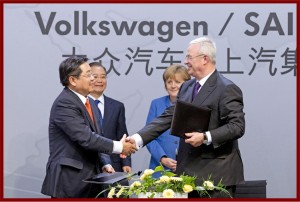
The People’s Republic of China is the Volkswagen Group’s largest market. China, arguably, is now or will become the center of the mobility universe.
Whether the capital devouring auto industry can transform itself into emerging mobility businesses and stay out of bankruptcy and satisfy investors are the ghosts haunting C-suites and Boards these days. The industry is undergoing a transformation to something unknown as outsiders such as Google with virtually unlimited capital are preparing and positioned to lead the way into 21st century mobility with hyper-connected hybrid cars, electric vehicles, robot vehicles and autonomous taxi and delivery services. (Significant Stories, Trends of 2017. And 2018?)
Against this backdrop and with a possible shakeout as devastating as occurred more than a century ago as the automobiles emerged, and companies appeared and disappeared it’s not surprising that long established automakers are seeking collaborative agreements to share the risks, cut the cost of research, development and production to survive as an entity when taking an individual road appears paved with diminishment or doom.
Earlier this week Volkswagen AG and Ford Motor Company said they have signed a Memorandum of Understanding exploring a strategic alliance “designed to strengthen each company’s competitiveness and better serve customers globally.” What was once unthinkable is two successful competitors undertaking projects aimed “to strengthen each company’s competitiveness.”
In the respective boardrooms, AutoInformed opines, each group is wishing the other limited success. Volkswagen employs three times the number of people that Ford does.
Dr. Thomas Sedran, Head of Volkswagen Group Strategy said, “Markets and customer demand are changing at an incredible speed. Both companies have strong and complementary positions in different commercial vehicle segments already. To adapt to the challenging environment, it is of utmost importance to gain flexibility through alliances. This is a core element of our Volkswagen Group Strategy 2025. The potential industrial cooperation with Ford is seen as an opportunity to improve competitiveness of both companies globally.” (Drinking the Electrolyte? Audi Plans to Sell 800K EVs in 2025)
As Corporate Mobility version dot-1.0, VW and Ford emphasized that any strategic alliance would not involve equity arrangements, including cross ownership stakes. This version of the software will no doubt evolve into Dot-2.0 with equity stakes among weaker companies as the shakeout progresses. (Failing Grade for Ford Motor Q1 Earnings)
There’s a Lot of Jobs, Money at Stake
As it stands now, the number of brands, companies and employees involved in this transformation – if it succeeds – is staggering.
The Volkswagen Group with headquarters in Wolfsburg is one of the world’s leading automobile manufacturers and the largest carmaker in Europe. The Group comprises twelve brands from seven European countries: Volkswagen Passenger Cars, Audi, SEAT, ŠKODA, Bentley, Bugatti, Lamborghini, Porsche, Ducati, Volkswagen Commercial Vehicles, Scania and MAN. Each brand operates as an independent entity on the market. Products range from motorcycles to small cars and luxury vehicles. In the commercial vehicle sector, there are pick-ups, buses and heavy trucks.
The VW Group operates 120 production plants in 20 European countries and a further 11 countries in the Americas, Asia and Africa. Every weekday, around 642,292 employees worldwide produce nearly 44,170 vehicles, and work in vehicle-related services or other fields of business. The Volkswagen Group sells its vehicles in 153 countries.
Ford Motor Company is a global company based in Dearborn, Michigan. The company designs, manufactures, markets and services a full line of Ford cars, trucks, SUVs, electrified vehicles and Lincoln luxury vehicles, provides financial services through Ford Motor Credit Company. Ford employs approximately 202,000 people worldwide.

